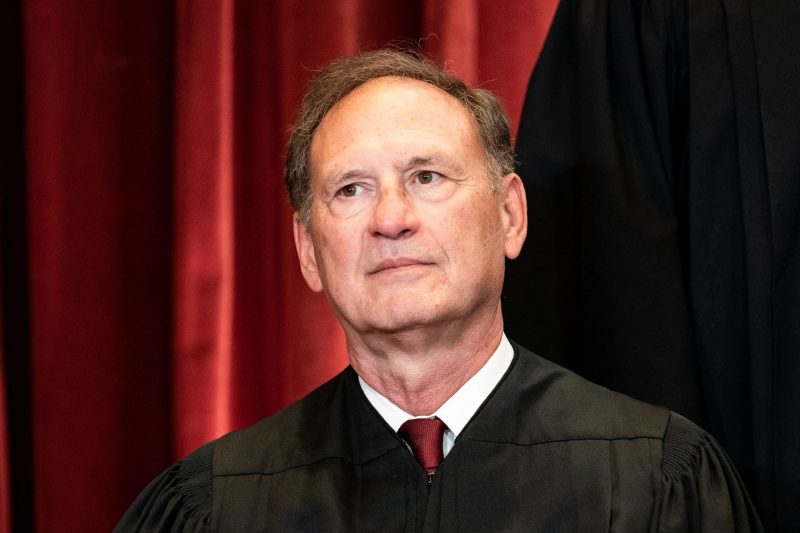
The Supreme Court thrives on hypotheticals. Alito’s latest sparked a backlash.
Supreme Court justices live on hypotheticals. And sometimes they blow up in their faces.
Justice Samuel A. Alito Jr. found that out Monday. His questions about Black shopping mall Santas and kids dressed in Ku Klux Klan outfits — in a case involving whether a Christian graphic artist must create a wedding website for a same-sex couple — became fodder on social media for complaints that he was being insensitive or unserious about a case in which he is likely to be in the majority, ruling for the designer.
The justices often use “hypos” to test legal theories and the limits of a party’s argument. That’s in part because the court doesn’t intervene just to decide the particulars of the case before it, but to establish jurisprudence that governs the nation.
And challenger Lorie Smith’s claim that she could not create a website for a same-sex wedding without violating her religious beliefs — a position that Colorado says runs afoul of the state’s anti-discrimination law protecting on the basis of sexual orientation — was ripe with imagined applications.
Briefs in the case brought up a Hindu calligrapher hypothetically being commissioned to write “Jesus is Lord,” a Democratic freelance speechwriter possibly being forced to provide his services to Republicans and whether a Christmas store might have the right to say “No Jews allowed.”
It was liberal Justice Ketanji Brown Jackson who first brought up the idea of shopping mall Santas. She imagined a hypothetical business at the mall that offered a product called “Scenes with Santa,” which would produce sepia-toned images with “its own view of nostalgia about Christmases past,” sort of like scenes from the movie “It’s a Wonderful Life.”
Because they’re trying to “capture the feelings of a certain era, their policy is that only White children can be photographed with Santa in this way,” Jackson posited. She added that the business “will gladly refer families of color to the Santa at the other end of the mall who will take anybody.”
Smith’s lawyer, Kristen Waggoner, struggled to answer the question of whether that refusal should be allowed. Under dogged follow-ups by Jackson, Waggoner concluded, “I say that that same clarity of the message isn’t in that photo, but, there are difficult lines to draw and that may be an edge case, but [Smith’s case] is not.”
Justice Elena Kagan sounded incredulous: “It ‘may be an edge case’ meaning it could fall on either side, you’re not sure?”
When Colorado Solicitor General Eric R. Olson was before the justices, Alito, a conservative, resumed the Santa discussion — with his own twist.
“Justice Jackson’s example of the — the Santa in the mall who doesn’t want his picture taken with Black children, so if there’s a — a Black Santa at the other end of the mall, and he doesn’t want to have his picture taken with a child who’s dressed up in a Ku Klux Klan outfit, that — that Black Santa has to do that?” Alito asked.
“No,” Olson replied, “because Ku Klux Klan outfits are not protected characteristics under public accommodation laws.”
Then Kagan jumped in: “And, presumably, that would be the same Ku Klux Klan outfit regardless whether the child was Black or White or any other characteristic.”
Before Olson could respond to Kagan, Alito replied, somewhat sarcastically: “You do see a lot of Black children in Ku Klux Klan outfits, right? All the — all the time.”
There was nervous laughter in the court, and it seemed unclear whether Alito was joking about Black children in Klan outfits or reacting to the idea that a Black child would wear such a thing.
Kagan took over at that point, raising a different hypothetical. But Alito later in the argument returned “back to my Black Santa example.”
If a state said a business could not discriminate on the basis of political ideology — as some jurisdictions do — “then the picture has to be taken?” Alito asked Olson.
“I think that is likely — those political ideology distinctions face much more difficult constitutional scrutiny, and I think are separate in kind from the kind of characteristics that we’re talking about here, which are categories of invidious discrimination,” Olson said in response.
Alito is an effective questioner on the bench, feared by lawyers advocating for liberal causes. But humor is not his forte, and he often complains that the media misrepresents his views. He once began a stern address to the conservative Federalist Society by saying he was pessimistic that his comments would not be twisted or misunderstood. Still, he said, “here goes.”
Liberals, meanwhile, are hardly in a mood to be charitable about Alito’s intentions after he wrote the opinion last term that overturned the right to abortion established by Roe v. Wade. He also recently denied an allegation by a former antiabortion activist that he or his wife disclosed to conservative donors the outcome of a pending 2014 case regarding contraceptives and religious rights.
Alito’s “Black Santa” example was not the only comment Monday that drew fire.
Another of his hypotheticals involved a request for a photographer to take a photo for the person’s “Jdate dating profile.”
“It’s a dating service, I gather, for Jewish people,” said Alito, a devout Catholic.
Kagan, who is Jewish, chimed in: “It is.”
That also prompted laughter in the courtroom.
Alito followed up: “All right. Maybe Justice Kagan will also be familiar with the next website I’m going to mention. So, next, a Jewish person asks a Jewish photographer to take a photograph for his ashleymadison.com dating profile.”
That is a website in which married people look for partners for affairs. As the court’s official transcript shows, that comment, once again, produced “(Laughter.)”
“I’m not suggesting that,” Alito said in response to the chuckles. “I mean, she knows a lot of things. I’m not suggesting — okay. Does he have to do it?”
